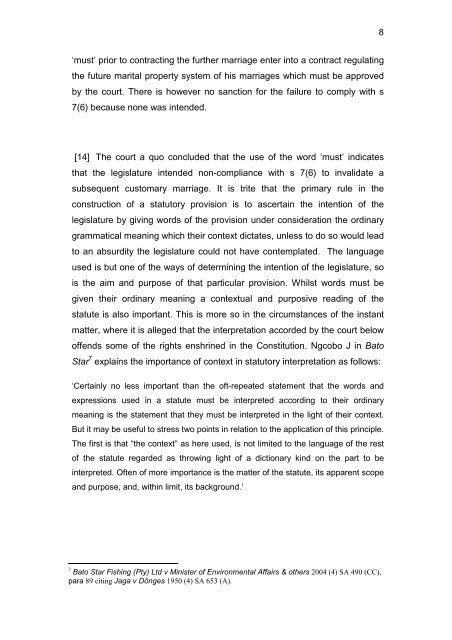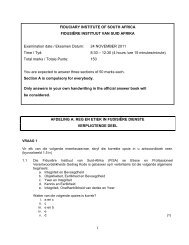Ngwenyama v Mayelane wedding after customary wedding
Ngwenyama v Mayelane wedding after customary wedding
Ngwenyama v Mayelane wedding after customary wedding
Create successful ePaper yourself
Turn your PDF publications into a flip-book with our unique Google optimized e-Paper software.
8<br />
‘must’ prior to contracting the further marriage en ter into a contract regulating<br />
the future marital property system of his marriages which must be approved<br />
by the court. There is however no sanction for the failure to comply with s<br />
7(6) because none was intended.<br />
[14] The court a quo concluded that the use of the word ‘must’ indicates<br />
that the legislature intended non-compliance with s 7(6) to invalidate a<br />
subsequent <strong>customary</strong> marriage. It is trite that the primary rule in the<br />
construction of a statutory provision is to ascerta in the intention of the<br />
legislature by giving words of the provision under consideration the ordinary<br />
grammatical meaning which their context dictates, u nless to do so would lead<br />
to an absurdity the legislature could not have cont emplated. The language<br />
used is but one of the ways of determining the inte ntion of the legislature, so<br />
is the aim and purpose of that particular provision . Whilst words must be<br />
given their ordinary meaning a contextual and purpo sive reading of the<br />
statute is also important. This is more so in the c ircumstances of the instant<br />
matter, where it is alleged that the interpretation accorded by the court below<br />
offends some of the rights enshrined in the Constit ution. Ngcobo J in Bato<br />
Star 7 explains the importance of context in statutory in terpretation as follows:<br />
‘Certainly no less important than the oft-repeated statement that the words and<br />
expressions used in a statute must be interpreted a ccording to their ordinary<br />
meaning is the statement that they must be interpre ted in the light of their context.<br />
But it may be useful to stress two points in relati on to the application of this principle.<br />
The first is that “the context” as here used, is no t limited to the language of the rest<br />
of the statute regarded as throwing light of a dict ionary kind on the part to be<br />
interpreted. Often of more importance is the matter of the statute, its apparent scope<br />
and purpose, and, within limit, its background.’<br />
7 Bato Star Fishing (Pty) Ltd v Minister of Environme ntal Affairs & others 2004 (4) SA 490 (CC),<br />
para 89 citing Jaga v Dönges 1950 (4) SA 653 (A).



![Motsepe v Khoza customary marriage and child[3]](https://img.yumpu.com/44777240/1/184x260/motsepe-v-khoza-customary-marriage-and-child3.jpg?quality=85)


